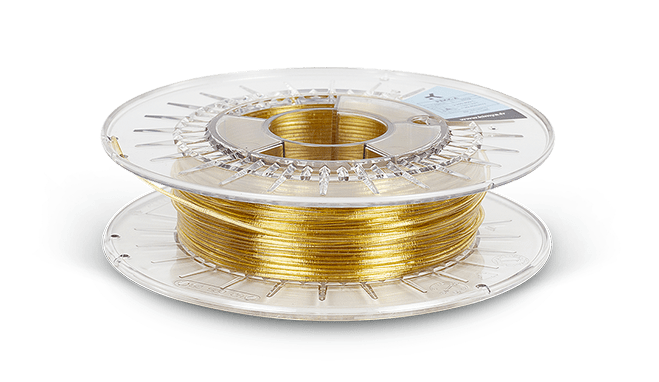PEKK
Le PEKK est un polymère de haute performance de la famille des PAEK, dont les applications sont très variées.
Le PEKK est un polymère de haute performance de la famille des PAEK, dont les applications sont très variées.

Le PEKK est généralement imprimé et laissé dans un état amorphe. L’utilisateur doit prendre soin de ses conditions de stockage – le PEKK est très sensible à l’humidité. En raison de ses propriétés uniques, il est souvent utilisé pour remplacer les composants faits en alliages métalliques.

Le PEKK est un matériau très polyvalent : il combine la résistance chimique, les propriétés ignifuges et les propriétés mécaniques, qui sont parmi les plus élevées de tous les thermoplastiques connus. Le taux de cristallisation est légèrement inférieur à celui du PEEK, ce qui rend le contrôle beaucoup plus facile et peut conduire à une meilleure adhérence des couches, ce qui signifie qu’une résistance à la traction encore plus importante peut être obtenue dans chaque axe par rapport au PEEK. Cette matière est l’une des meilleurs exemples de polymères ayant des propriétés de résistance élevée.
Lors de l’impression à partir de cette matière sur les imprimantes de 3DGence de la gamme INDUSTRY, des supports solubles peuvent être utilisés. L’ESM-10 est compatible avec cette matière.

PEKK Carbon is a thermoplastic polymer reinforced with carbon fibre which gives a high level of rigidity and heat resistance. Components produced from PEKK Carbon can be exposed to acids and hydrocarbons, like fuels and lubricants, and can be used as elements of engine housings.
PEKK Carbon offers a slower crystallisation speed than PEEK, which enables transformation at lower room temperatures, offering better interlayer adhesion and less warping. Parts are produced with an improved visual finish and better mechanical properties.

PEKK-CF is a unique carbon alloy from the PAEK family. It is a pseudo amorphous semi-crystalline material with a low Ether/Ketone ratio that offers excellent thermomechanical properties. Compared to PEEK, PEKK Carbon offers slower crystallisation speed enabling transformation at lower room temperatures, both plate and nozzle, offering better interlayer adhesion and less warping. The print process is easier to set up as well.
PEKK-CF also offers a high level of resistance to UV and high temperatures, in addition to excellent chemical resistance superior even to PEI. Heat deflection temperature is of 150°C. It features UL94 V0 flame retardance capability which is inherent for this material grade. PEKK-CF has a high dielectric stability, thus can be used as an insulator or electrical appliances housing material.
The use of an industrial 3D printer allows easily replacing the grinder's side handle in case of damage of the original.
3D printing is a quick method to get custom items. Tablet car mount was made with ABS, the same material as the dashboard, to maintain a similar design.
The prototype made with ULTEM™ was used for functional laboratory tests.
3D printing is a quick method to get custom items. 3DGence engineer made from reinforced material such as PA-CF a server casing.
In record time – only 5 days of printing, 3DGence engineers built a 120 kg robotic arm with great repeatability of movement. It has six degrees of freedom and can easily manipulate other objects.
The implementation of 3D printing inside the company has a number of benefits. With this technology, Balluff’s engineers can design completely new assembly elements, that are extension of a ready company solution.
Nous vous aiderons à choisir une matière appropriée